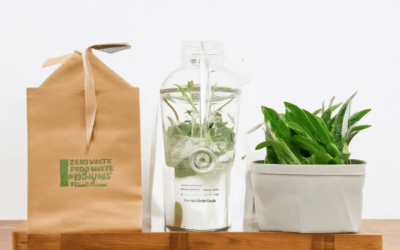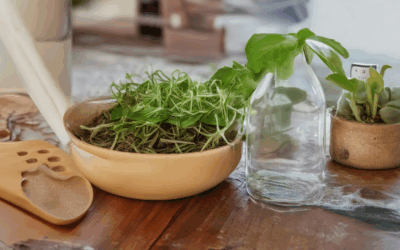As the world continues to prioritize sustainability and eco-conscious living, many individuals are seeking innovative ways to reduce their environmental footprint. One of the most effective approaches to achieving this goal is through the practice of zero waste hacks. By adopting a zero waste lifestyle, individuals can significantly minimize their contribution to landfills while promoting a healthier planet. Whether you’re new to the concept or looking to refine your existing habits, this guide offers practical tips, strategies, and examples to help you embrace a zero waste lifestyle. From mastering the five essential rules of zero waste to discovering creative hacks for reducing, reusing, and recycling, this article provides everything you need to kickstart your journey toward a greener, more sustainable way of living. Join us as we explore the ins and outs of zero waste hacks, offering actionable advice that aligns with both your values and your daily routine.
Key Takeaways
- Adopt Zero Waste Principles: Design products without harmful substances, optimize resource use, eliminate toxic disposal, create durable goods, and promote recycling and composting.
- Slash Waste Generation Efficiently: Implement closed-loop systems, reduce resource consumption, avoid incineration, lengthen product lifespans, and boost sustainable material practices.
- Save Costs and Resources: Extend product lifespans, cut energy use, minimize packaging waste, and enhance operational efficiency.
- Live a Sustainable Lifestyle: Reduce plastic use, plan meals wisely, reuse and repurpose, choose eco-friendly products, understand recycling protocols, avoid single-use items, support local businesses, compost, use reusable containers, adopt sustainable transport, shop sustainably, manage waste responsibly, embrace minimalism, stay informed, and track progress consistently.

What Are the 5 Rules of Zero Waste?
Eco Planeta Verde is committed to helping individuals and communities adopt sustainable living practices. One key principle of zero waste living is following the 5 R’s: Refuse, Reduce, Reuse, Recycle, and Rot. These guidelines help minimize waste generation and promote a more eco-friendly lifestyle.
- Refuse: Avoid purchasing items that create unnecessary waste. Choose products made from sustainable materials and opt for items that can be reused or recycled.
- Reduce: Consciously minimize your consumption. This includes reducing food waste through meal planning and using reusable containers for household items.
- Reuse: Find creative ways to repurpose items rather than discarding them. For example, turn old jars into storage containers or use scrap paper for notes.
- Recycle: Recycling properly is crucial. Familiarize yourself with your local recycling guidelines and ensure recyclables are free of contaminants.
- Rot: Compost organic waste to return nutrients to the earth. This not only reduces landfill waste but also creates nutrient-rich soil for gardening.
Eco Planeta Verde offers comprehensive resources on implementing these practices effectively. Learn more about waste reduction strategies and discover how you can adopt a zero-waste lifestyle today!
Zero Waste Strategies
Zero waste strategies aim to minimize waste generation, promote sustainability, and create a more eco-friendly lifestyle. Here are some effective approaches to achieving a zero waste lifestyle:
Reduce Waste at the Source
- Design for Durability and Repairability : Create products that last longer and can be repaired, reducing the need for replacements.
- Minimize Packaging : Choose products with minimal packaging and support companies that use recycled materials.
- Promote Circular Economy : Support businesses that take responsibility for their products, allowing for easy repairs, refurbishing, or recycling.
Reuse Materials
- Set Up Collection Centers : Establish local drop-off points for reusable materials like glass, metal, and plastic.
- Encourage Freecycle Groups : Join or create groups where people can exchange or donate unused items.
Effective Recycling
- Separate Recyclables : Ensure waste is sorted correctly to maximize recycling rates.
- Utilize Drop-Off Locations : Use designated recycling centers for items that aren’t picked up by trash services.
Composting
- Home Composting : Turn kitchen scraps and yard waste into nutrient-rich soil through composting.
- Industrial Composting : Support commercial operations that process organic waste into mulch or soil amendments.
Prevent Waste Generation
- Educate Consumers : Promote awareness through campaigns and workshops to reduce single-use items.
- Offer Incentives : Partner with businesses to offer discounts for reusable containers or bulk purchase programs.
By implementing these strategies, we can work towards a world where resources are used efficiently, and waste is minimized. For more tips and resources, visit our Eco Planeta Verde website.
Additionally, exploring similar initiatives from other organizations like Earth Day and Greenpeace can provide further inspiration and practical solutions.

The 7 R’s of Zero Waste
The concept of the 7 R’s of zero waste provides a comprehensive framework for minimizing waste effectively. Here’s a breakdown of each principle:
- Rethink : Design products with sustainability in mind, focusing on durability and recyclability.
- Refuse : Avoid purchasing items that aren’t necessary and reduce excessive packaging usage.
- Reduce : Minimize resource consumption during production processes.
- Reuse : Find creative uses for items before they become waste, such as repurposing containers.
- Repair : Fix damaged goods rather than discarding them, extending their useful life.
- Recycle : Properly recycle materials that cannot be reused or repaired, ensuring they are processed efficiently.
- Rot : Compost organic waste to convert it into valuable resources like compost.
By following these steps, individuals can play a significant role in achieving a zero-waste lifestyle, promoting sustainability, and reducing environmental impact.

What is the Zero Waste Technique?
The zero waste technique is a holistic approach to designing and managing products, processes, and systems with the aim of eliminating waste at its source. This method focuses on creating closed-loop systems where materials are reused, recycled, or composted, thereby minimizing environmental impact.
Key Principles of Zero Waste
- Avoid Toxic Materials: Design products without hazardous substances that can harm ecosystems or human health.
- Conserve Resources: Optimize resource use to reduce consumption and minimize waste generation.
- Eliminate Incineration and Burial: Avoid disposal methods that release toxins into the environment or deplete natural resources.
- Design for Durability: Create long-lasting products to reduce the frequency of replacements and associated waste.
- Encourage Recycling and Composting: Promote systems that facilitate easy recycling, upcycling, and composting of materials.
Benefits of Adopting Zero Waste Techniques
By implementing zero waste techniques, organizations and individuals can achieve several benefits, including cost savings, improved efficiency, and a reduced environmental footprint. These practices align with global sustainability goals and contribute to a healthier planet for future generations.
How to Get Started
Adopting zero waste techniques requires a commitment to sustainable practices at every stage of product lifecycle. Start by assessing current processes, identifying areas for improvement, and collaborating with stakeholders to develop circular economy models. Tools like life cycle assessment (LCA) can help evaluate the environmental impact of products and guide decision-making.
Eco Planeta Verde offers resources and guides to help individuals and businesses adopt zero waste practices. Explore our blog and guides for practical tips on reducing waste, conserving resources, and creating a more sustainable lifestyle.
Learn more about sustainable living practices and how you can contribute to a zero waste future.
How to Start a Zero-Waste Lifestyle
Starting a zero-waste lifestyle involves making intentional changes to reduce waste generation and promote sustainability. Here’s a step-by-step guide to help you begin:
- Assess Your Daily Habits: Identify areas where you generate the most waste, such as packaging, food, and household items.
- Reduce Plastic Use: Bring your own containers to grocery stores or markets. Use reusable bottles, jars, and bags.
- Meal Planning: Plan meals to minimize food waste. Shop based on what you need and avoid overbuying.
- Reuse and Repurpose: Turn scrap materials into useful items. For example, old jars can become storage containers or plant pots.
- Choose Sustainable Household Products: Replace single-use items with reusable alternatives like cloth towels, biodegradable sponges, and eco-friendly cleaning supplies.
- Educate Yourself on Recycling: Familiarize yourself with local recycling guidelines to ensure waste is processed correctly and efficiently.
- Minimize Single-Use Items: Opt for products without packaging, such as shampoo bars, toothpaste tablets, and menstrual products.
- Support Local Businesses: Buy from local farms, producers, and shops to reduce transportation emissions and support sustainable practices.
- Compost Kitchen Scraps: If possible, compost organic waste to create nutrient-rich soil and reduce landfill contributions.
- Use Reusable Containers: Bring your own containers to cafes, restaurants, and delis to avoid single-use packaging.
- Adopt Sustainable Transportation: Walk, bike, or use public transport to reduce reliance on single-occupancy vehicles.
- Shop Sustainably: Purchase products in bulk, grow your own plants, and buy second-hand items to reduce waste and consumption.
- Dispose of Waste Responsibly: Properly dispose of medications and electronic waste through designated programs to prevent harm to the environment.
- Maintain a Minimalist Lifestyle: Declutter and only keep what you truly need. Repair rather than replace items whenever possible.
- Stay Informed and Inspired: Join online communities, follow sustainability blogs, and watch educational videos to learn from others’ experiences and stay motivated.
- Track Progress and Stay Patient: Keep track of your efforts and celebrate small victories. Change takes time, so focus on gradual, consistent improvements.
By implementing these steps, you can create a more sustainable lifestyle that reduces waste and contributes positively to the environment. Remember, every small change makes a big difference!

What are the 10 examples of reduce?
Eco Planeta Verde encourages sustainable living through various practices that help reduce our environmental footprint. Here are 10 practical examples:
- Install a rainwater harvesting system to conserve water.
- Start composting kitchen scraps to create nutrient-rich soil.
- Use a reusable water bottle instead of disposable ones.
- Participate in clothing swap events to reduce textile waste.
- Repair damaged items rather than discarding them.
- Adopt a plant-based diet to minimize agricultural runoff.
- Walk, bike, or take public transportation to reduce carbon emissions.
- Use reusable containers for food storage and shopping.
- Buy locally-grown and organic products to reduce packaging.
- Turn off lights and unplug electronics when not in use.
Eco Planeta Verde believes that small changes can lead to significant impacts. By incorporating these practices into daily life, individuals can contribute to a healthier planet for future generations.




0 Comments